| In
the experiences of the Democratic Republic of the Congo
(DRC) and of Africa, the iterations of assassinations were
meant to kill the genuine self-determination of the African
peoples. Of these crimes, the murder and cover up of the
assassination of Patrice Lumumba continues to reverberate
across Africa, crying out for a break  from
the recursive patterns of genocidal politics and economics.
Patrice Lumumba was the first democratically elected prime
minister of the Congo. The DRC won its independence in June
1960, but the wishes of the Belgian colonialists were that
the conditions after independence should not be different
from that of the colonial era. In the Congo, Belgium – a
small divided society in Europe – had worked to get a seat
at the table of imperial overlords. In the eyes of the Belgians,
the crime of Patrice Lumumba was that he refuted the speech
of the King of Belgium at the independence celebration in
June 1960. Lumumba refused to accept the representation
of the Belgian mission as one of civilising and modernising
the Congolese peoples. Lumumba was removed from office less
than two months after independence. He was placed under
house arrest; he escaped but recaptured, beaten, tortured
and eventually eliminated. This pattern of murder, torture
and destruction continues today, 50 years after the assassination
of Patrice Lumumba. from
the recursive patterns of genocidal politics and economics.
Patrice Lumumba was the first democratically elected prime
minister of the Congo. The DRC won its independence in June
1960, but the wishes of the Belgian colonialists were that
the conditions after independence should not be different
from that of the colonial era. In the Congo, Belgium – a
small divided society in Europe – had worked to get a seat
at the table of imperial overlords. In the eyes of the Belgians,
the crime of Patrice Lumumba was that he refuted the speech
of the King of Belgium at the independence celebration in
June 1960. Lumumba refused to accept the representation
of the Belgian mission as one of civilising and modernising
the Congolese peoples. Lumumba was removed from office less
than two months after independence. He was placed under
house arrest; he escaped but recaptured, beaten, tortured
and eventually eliminated. This pattern of murder, torture
and destruction continues today, 50 years after the assassination
of Patrice Lumumba.
From the time of the assassination of Lumumba, almost every
African leader who sought to chart a course for genuine
independence was assassinated, whether it was Eduardo Mondlane,
Amilcar Cabral, Herbert Chitepo, Samora Machel, Thomas Sankara,
Felix Moumie, Chris Hani or Steve Biko. Violence against
leaders was accompanied by the intimidation and assassination
of journalists, students, opposition leaders and any social
force that challenged oppression of Africans and the plunder
of their resources. This nested loop of genocidal thinking,
genocidal economics and genocidal politics has generated
11 wars in the Congo since 1960, and all of these wars have
had implications for almost all the regions of Africa in
relation to genocide, militarism, dictatorship, economic
plunder and patriarchal models of liberation.
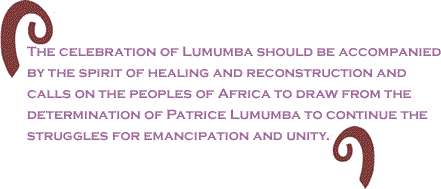
The task of reconstruction and the recovery of the dignity
of the Congo and of Africa is a challenge that requires
a decisive and revolutionary break with the ideas, organisations
and the modes of political and economic practices that dehumanises
Africans. The youth of Africa are everywhere calling for
an elaboration of their humanity, and are challenging the
devaluation of life. From Tunisia and Egypt in the North
to South Africa and Zimbabwe in the South, the youths are
seeking new organisations and ideas that can break from
the centuries of oppression. The celebration of Lumumba
should be accompanied by the spirit of healing and reconstruction
and calls on the peoples of Africa to draw from the determination
of Patrice Lumumba to continue the struggles for emancipation
and unity.
PATRICE LUMUMBA AND THE BURDEN OF HISTORY
Despite the history of European plunder, looting and savagery
in the Congo from the period of the trans-Atlantic slave
trade to the present, the intellectual culture of the West
represents the peoples of the Congo and Africa as uncivilised,
open to atavistic violence and awaiting modernisation projects
from Europeans. In November, I attended a session of the
African
Studies Association meeting in San Francisco,
USA, where there were some young scholars making a presentation
on Eastern Congo. In the main, the quality of the work was
so shallow and devoid of historical context that one Congolese
scholar in the back of the room asked if the presenters
were aware that there were Congolese scholars who have been
doing scholarly work on reconstruction and peace in the
Congo. This question is very pertinent in the present moment
in so far as many of the scholars and researchers from Turkey,
India, Brazil, China, Korea, Vietnam and Japan turn to the
work of European and US conservative scholars to orient
their ‘humanitarian’ projects in Africa. Jacques Depelchin,
Nzongola Ntalaja and countless others have documented the
horrors of the forced labour, brutality and the genocide
of over ten million Africans by the Belgians but their brand
of scholarship and activist intervention was marginalised
by the dominant Western intellectual institutions.
The documentation of Western atrocities in the Congo has
also been brought to a wider audience by the writer Adam
Hochschild, whose book, King
Leopold's Ghost: A Story of Greed, Terror, and Heroism in
Colonial Africa , has reached a wider community than that which
was accessible to African researchers and scholars. Hochschild
built upon the work of Mark Twain in bringing to a larger
audience the plunder and murder of the colonial enterprise.
In his day, Malcolm X challenged mainstream historians and
linked the history of genocide in the pan-African world
to the murder of Lumumba and the search for self-determination
by the peoples of the Congo.
, has reached a wider community than that which
was accessible to African researchers and scholars. Hochschild
built upon the work of Mark Twain in bringing to a larger
audience the plunder and murder of the colonial enterprise.
In his day, Malcolm X challenged mainstream historians and
linked the history of genocide in the pan-African world
to the murder of Lumumba and the search for self-determination
by the peoples of the Congo.
Scholars trained in African studies centres of the West could
not write clearly about the iterations of assassinations
because of the ways in which the academy had been polluted
by the modernising discourse that was supposed to depoliticise
Africans. Malcolm X challenged US scholars to detail the
massacres in the Congo. In a well-publicised exchange at
Brooklyn College on 24 November 1964, the professors told
Malcolm X that he was an alarmist and that Leopold civilised
the Africans in a humanitarian campaign. It was in this
intellectual climate that Newt Gingrich, the former speaker
of the US House of Representatives was reared. Gingrich
wrote his doctoral thesis at Tulane University on the civilising
role of the Belgians in the Congo. In some academic centres,
such as the African Studies Center at the University of
Wisconsin Madison, there were specialists on politics
in the Congo. The students of these professors have
dominated the US bureaucracy and academia for the past 40
years, reproducing modernisation theories and the failings
of the ‘tribal’ African.
Malcolm X himself was assassinated in February 1965 when
he articulated a clear understanding of the linkages between
racism and oppression in the United States and massacres
and murders in Africa. His famous dictum, ‘You cannot understand
what is going on in Mississippi if you do not understand
what is going on in the Congo’ is as true today as it was
when he uttered these words. The current military crisis
in the DRC (especially in the Eastern regions) brings out
the need for activists to grasp the burden of history in
order to understand the present and chart a new course for
the future.
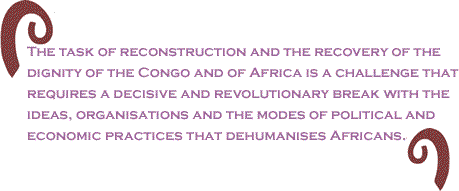
These utterances by Malcolm X were part of his work as a
mobiliser and truth teller. Malcolm X met with Abdurrahman
Babu and Che Guevara in 1964 after the Johnson administration
supported mercenaries to abort the second independence struggle
in the Congo. Their meeting had agreed on a strategy to
move beyond political mobilising to put in place a plan
for liberation in the Congo and in the Americas. Four months
after this historic meeting between three great freedom
fighters, Malcolm X was gunned down in Harlem and the CIA
hunted down and murdered Che Guevara. (See details in the
book by Karl Evanzz, ‘The
Judas Factor: The Plot to Kill Malcolm X ’). Professor Manning Marable is also working on
a new book that exposes the conspiracy to murder and cover
up.
’). Professor Manning Marable is also working on
a new book that exposes the conspiracy to murder and cover
up.
The iterations of assassinations had taken their own roller
coaster ride so that not even the president of the United
States was immune to this mindset of killing and murder.
John F. Kennedy was assassinated in November 1963 by the
forces of the military industrial complex and the intelligence
agencies that continue to promote death tendencies all over
the world. James Douglass, in his book, JFK
and the Unspeakable: Why He Died and Why It Matters ,
has documented in extensive detail how the cover-up of the
assassination has been even more elaborate and meticulous
than the actual assassination. This same cover-up continues
in the cases of Martin Luther King Jr and hundreds of freedom
fighters whose lives have been snuffed out at an early age. ,
has documented in extensive detail how the cover-up of the
assassination has been even more elaborate and meticulous
than the actual assassination. This same cover-up continues
in the cases of Martin Luther King Jr and hundreds of freedom
fighters whose lives have been snuffed out at an early age.

COLLUSION BETWEEN INTELLECTUALS IN USA AND WESTERN EUROPE
Since the murder of Lumumba, mainstream intellectual work
inside Europe and North America has covered up and distorted
the conditions under which Lumumba was assassinated. Former
officials of the United Nations have written a number of
books on the influence of the United States over the decision
making processes in international bodies dealing with the
Congo at this time. The record has been established by various
authorities on the manipulation of the major international
institutions in order to cover up murder. The United States
manipulated the United Nations on the question of the Congo
so that Patrice Lumumba and Kwame Nkrumah who had called
for UN intervention against European mercenaries found that
the UN was working to support the same mercenaries and their
employers in Belgium, France, and the United States. When
Dag Hammarskjöld, the secretary general of the UN, woke
up to this manipulation, he himself was assassinated. Many
UN operatives who were appalled by the callous behaviour
of the US and the CIA have written about the sordid tale
of Moose Tshombe (puppet leader of Katanga) and the secession
in Katanga. Kwame Nkrumah wrote ‘Challenge
of the Congo ’ to underline the centrality of this challenge
for the unification and liberation of Africa.
’ to underline the centrality of this challenge
for the unification and liberation of Africa.
Richard Mahoney who wrote the book, JFK:
Ordeal in Africa had studied the tremendous energies invested in
the control of the Congo in the period when the US was implicated
in the murder of Patrice Lumumba. Mahoney termed the whole
thrust of the policy a story of stupidity. This study, the
product of a doctoral dissertation at John Hopkins University,
detailed how the Congo became the centrepiece of US African
policy in the 1960s. Mahoney made the argument that the
US foreign policy was confused in purpose and contradictory
in execution. But he did not challenge the fundamental realist
and androcentric assumptions of graduate training. The role
of the CIA and elements of the State Department in building
alternatives to Patrice Lumumba leading to the massive support
for Mobutism has been the subject of numerous studies. One
of these explicitly entitled, America’s Tyrant: The CIA
and Mobutu of Zaire covers the whole military, economic
and intelligence apparatus that was provided to enable Mobutu
to rule in a tyrannical manner over the peoples of the Congo.
President Clinton, in clear reference to the linkages between
the US government and Mobutu, apologised to the people of
Africa in Kampala, Uganda in March 1998 by declaring that
during the Cold War, the US was blinded by its confrontation
with the Soviet Union and hence supported elements such
as Mobutu. How can the activists ensure that these apologies
of the leader of the USA are not simple political gimmickry?
Up to the present, there needs to be a clearer exposure
of the US establishment and these assassinations. The attempt
to poison Patrice Lumumba exposed the mindset of biological
warfare that was to be later experimented in Africa. One
scholar also opened the reality that it was in the Congo
that the US first experimented with extraordinary rendition.
had studied the tremendous energies invested in
the control of the Congo in the period when the US was implicated
in the murder of Patrice Lumumba. Mahoney termed the whole
thrust of the policy a story of stupidity. This study, the
product of a doctoral dissertation at John Hopkins University,
detailed how the Congo became the centrepiece of US African
policy in the 1960s. Mahoney made the argument that the
US foreign policy was confused in purpose and contradictory
in execution. But he did not challenge the fundamental realist
and androcentric assumptions of graduate training. The role
of the CIA and elements of the State Department in building
alternatives to Patrice Lumumba leading to the massive support
for Mobutism has been the subject of numerous studies. One
of these explicitly entitled, America’s Tyrant: The CIA
and Mobutu of Zaire covers the whole military, economic
and intelligence apparatus that was provided to enable Mobutu
to rule in a tyrannical manner over the peoples of the Congo.
President Clinton, in clear reference to the linkages between
the US government and Mobutu, apologised to the people of
Africa in Kampala, Uganda in March 1998 by declaring that
during the Cold War, the US was blinded by its confrontation
with the Soviet Union and hence supported elements such
as Mobutu. How can the activists ensure that these apologies
of the leader of the USA are not simple political gimmickry?
Up to the present, there needs to be a clearer exposure
of the US establishment and these assassinations. The attempt
to poison Patrice Lumumba exposed the mindset of biological
warfare that was to be later experimented in Africa. One
scholar also opened the reality that it was in the Congo
that the US first experimented with extraordinary rendition.
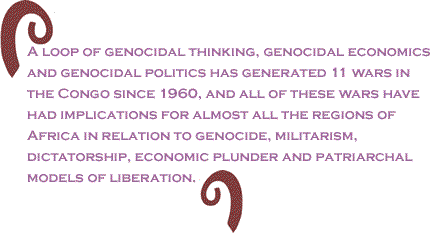
Neither the speech of the-then President Clinton nor policy
formulations from the current National Security apparatus
link the present policies of transnational corporations
to the kind of policies that connived to perpetrate the
elimination of Lumumba. The linkages between the bureaucracy
and the University in the Cold War produced a generation
of scholars who were steeped in the realist paradigms and
went between the foundations, the universities, the Pentagon,
the think tanks and the National Security Council. It was
like a revolving door where they quoted each other, supported
each other and provided a barrier to truth. From time to
time, the production of Area Handbooks provided a basis
for the assembling of the ideas sanctioned by scholars.
These scholars participated in an elaborate exercise to
provide political legitimacy for the US foreign policies
in Africa. Henry Kissinger best symbolised these realists
who could be termed organic scholars of the bourgeoisie.
Many of his protégés staffed the African Bureau in the State
Department and have left an indelible mark on the conceptualisation
of war and politics in Africa. Noam Chomsky has written
of the callousness and dehumanisation of the officials who
have overseen murder and violence in the name of strategic
minerals and strategic interests. He noted that, ‘Self-righteousness
comes naturally to those who are able to achieve their will
by force. They may also rest confident that the doctrinal
system will properly efface and sanitise the past, at least
among the educated sectors who are its agents and, arguably,
its most naïve victims.’
LET THE NEW SCHOLARSHIP ON TRUTH THRIVE AND GROW
There is now a spate of books on the role of the CIA and
the obsession of the US government with the so-called communist
threat. What many of these books did not make clear was
the level of coordination between the US and Belgians in
the plot to eliminate Lumumba. The book that broke the mould
and painstakingly outlined the plot in the clearest terms
was that of Ludo De Witte, The
Assassination of Lumumba .
De Witte spent several years doing archival work and interviewing
those involved in the assassination. It was after this book
was published that the government of Belgium was forced
to open up a parliamentary inquiry into the assassination.
This parliamentary inquiry heard testimonies from a wide
cross section of operatives in the Belgian state. .
De Witte spent several years doing archival work and interviewing
those involved in the assassination. It was after this book
was published that the government of Belgium was forced
to open up a parliamentary inquiry into the assassination.
This parliamentary inquiry heard testimonies from a wide
cross section of operatives in the Belgian state.
In February 2002, the government of Belgium accepted moral
responsibility for the assassination of Lumumba. The Belgian
Foreign Minister declared in February 2002 that, ‘[i]n light
of criteria applicable today, certain members of the government
at the time and certain Belgian actors of that period carry
an irrefutable responsibility for the events that led to
the death of Patrice Lumumba.’ (quoted from Thomas Turner,
‘Crimes of the West in Democratic Congo: Reflections on
Belgian Acceptance of “Moral Responsibility” for the Death
of Lumumba’, in Genocide,
War Crimes and the West: History and Complicity .) .)
The declaration by the government of Belgium came after 40
years of research and writing on the assassination. The
cables from Washington and the role of the Central Intelligence
Agency (CIA) in organising the plot are now well known.
In 1975 Senator Frank Church carried out investigations
on the ‘Alleged
Assassination Plots Involving Foreign Leaders,’
published in Senate Report 94-465, 94th Congress 1975.
Despite the record of the Church Committee and this parliamentary
inquiry in Belgium, the reality is that the information
on the conspiracy to murder Lumumba is not widely circulated.
Belgian and European scholars continue to represent their
work in the Congo as that of civilising Africans. More significant,
has been the fact that this killing and the subsequent traditions
left by Mobutu has poisoned the political culture and political
life of the society. Mobutu’s government carried out extra
judicial killings and murdered students and trade union
leaders for thirty years. In 1990 there was an attempt to
develop the basis for a national Palaver in a Sovereign
National Conference. Neither the Congolese political careerists
nor the imperial supporters in Washington, Brussels and
Paris wanted the truth to come out. The genocidal wars in
the Central Africa region and the deaths of over five million
since the removal of Mobutu attest to the fact that once
the politics of impunity are embedded in a society it takes
generations to heal.
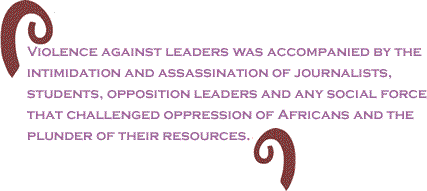
When Mobutu was overthrown in 1997 there were many discussions
on the need for the US to open the files on the Congo. Lawrence
Devlin, the ageing head of the CIA in Kinshasa at the time
of the assassination of Lumumba turned up at one of the
seminars. What was implicit in his presence was that there
should be no revelation on the role of the USA in the crimes
of Mobutu and that the ranks should be held. At the end
of 1999, it was officially confirmed by a story in the Washington
Post that President Eisenhower had given a direct order
for the elimination of Patrice Lumumba in the Congo in 1960.
This revelation confirmed what had been public knowledge
for forty years, that President Eisenhower had given direct
instructions to Allen Dulles, then director of the CIA for
the assassination of Lumumba. Now in the aftermath of the
Cold War, there are demands for opening the files so that
there can be a new beginning for the societies that were
destroyed.
In order to distort the real truth behind the assassination,
before his death, Devlin wrote his own book, Chief
of Station, Congo: Fighting the Cold War in a Hot Zone . Devlin’s book reproduced what had become the defining
element of the US foreign policy, a lame attempt to rekindle
the Cold War distortions that Lumumba was a communist and
that the USA was acting to prevent the spread of communism
in Africa. This brand of intellectual work was reinforced
by section of the US bureaucracy that ingratiated itself
with Mobutism and the circus of ‘humanitarian’ actors and
actresses who have descended on the Congo and Eastern Africa.
This circus has been underwritten by the massive investment
of the World Bank to perpetuate a ‘conflict resolution’
paradigm in Africa, to obfuscate the iterations of assassinations.
Throughout the misrule and oppression by Mobutu, the World
Bank and the IMF were partners in the oppression. After
Mobutu was removed, the Bank sought to link violence and
warfare in the DRC to ‘primary commodity production’. The
intellectuals of the World Bank joined in the discourse
with reports on the Economic Causes of Civil Conflict and
their Implications for Policy. After decades of foreign
aid, foreign investment and economic reforms, the Development
Research Group of the World Bank noted in their publication
‘Economic
Causes of Civil Conflict and their Implications for Policy’:
. Devlin’s book reproduced what had become the defining
element of the US foreign policy, a lame attempt to rekindle
the Cold War distortions that Lumumba was a communist and
that the USA was acting to prevent the spread of communism
in Africa. This brand of intellectual work was reinforced
by section of the US bureaucracy that ingratiated itself
with Mobutism and the circus of ‘humanitarian’ actors and
actresses who have descended on the Congo and Eastern Africa.
This circus has been underwritten by the massive investment
of the World Bank to perpetuate a ‘conflict resolution’
paradigm in Africa, to obfuscate the iterations of assassinations.
Throughout the misrule and oppression by Mobutu, the World
Bank and the IMF were partners in the oppression. After
Mobutu was removed, the Bank sought to link violence and
warfare in the DRC to ‘primary commodity production’. The
intellectuals of the World Bank joined in the discourse
with reports on the Economic Causes of Civil Conflict and
their Implications for Policy. After decades of foreign
aid, foreign investment and economic reforms, the Development
Research Group of the World Bank noted in their publication
‘Economic
Causes of Civil Conflict and their Implications for Policy’:
‘[A]s of 1995 the country with the
highest risk of civil conflict according to our analysis
was Zaire, with a three in four chance of conflict within
the ensuing five years.’
What was most revealing from the analysis of the World Bank
on the relationship between primary commodity extraction
and warfare was the extent to which questions of democratic
participation on the one hand and the global armaments culture
on the other are excluded from the policy alternatives offered
for peace. Paul Collier, then the director of the research
group of the World Bank argued that:
‘…the most powerful risk factor is
that countries which have a substantial share of their income
(GDP) coming from the export of primary commodities are
radically more at risk of conflict…. Thus, without primary
commodity exports, ordinary countries are pretty safe from
internal conflict, while when such exports are substantial
the society is highly dangerous. Primary commodities are
thus a major part of the conflict story.’
Collier graduated from this World Bank research position
to establish himself as an intellectual entrepreneur and
high priest of the enterprise of studying Africa. He pontificates
on warfare and violence from the safety and comfort of Oxford,
where he suggests military interventions and coups as solutions
for democratic governance in Africa. William Reno, Christopher
Clapham and many others have turned the study of war-lordism
into an academic industry without linking the plunder, mass
rape and warren that support these military entrepreneurs.
The conflict paradigm without historical reference to the
experiences of the Belgian mining companies and the role
of foreign corporations under Mobutu is represented with
the full authority of the name of the World Bank to argue
that countries ‘with Congo like geography’ and reliance
on primary exports are prone to ‘Civil Conflict.’
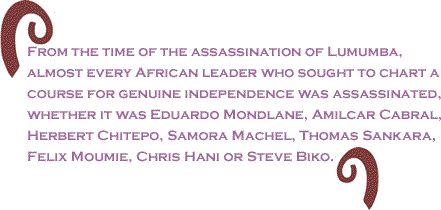
What was also missing was clarity on the differences between
the wars of plunder of elements such as Foday Sankoy’s and
Charles Taylor’s and the righteous struggles for liberation
that had been initiated by Patrice Lumumba. In the World
Bank model there is no room for the explanation of the struggles
for African dignity. Without this kind of interrogation
of the role of the World Bank, the West can continue to
think of the World Bank as an institution that can formulate
development plans for the reconstruction of the DRC for
a new era.
HEALING AND RECONSTRUCTION IN A NEW ERA
In the experience of the Congo and Central Africa, there
continues to be a distortion of the actual conditions that
generate warfare, rape and plunder today. One of the outcomes
of this distortion is that the US military can represent
itself as a force for peace by the ideas that are put forward
as justifications for the establishment of the US Africa
Command (AFRICOM). The counterinsurgency scholarship that
was unleashed by the Pentagon during the cover up of the
assassination of Lumumba is now being refinanced through
the Africa Command Social Science Research programme. However,
this research agenda comes up against the new energies of
organisations and individuals who want to make a break with
the iterations of assassinations. Whether it is the lobbying
groups who are opposed to AFRICOM or the peace and justice
campaigners organised as Friends of the Congo, there are
many who are using the anniversary of the assassination
of Patrice Lumumba as a platform for the exposure of the
crimes of US imperialism and Belgian complicity.
Lumumba’s assassination is relevant to current global politics
and the struggles for social transformation in Africa. As
de Witte quoted from Fanon who had noted that: ‘If Africa
was a revolver and the Congo its trigger…the assassination
of Lumumba and tens of thousands of other Congolese nationalists,
from 1960-1965, was the West’s ultimate attempt to destroy
the continent’s authentic independent development‘ (xxv).
De Witte rightly argued that:
‘After his death, the corrupt and
dictatorial puppet regimes that popped up throughout Africa,
supported by Western money and weapons, effectively stifled
African nationalism and independence. Attempts to cover-up
the assassination not only dishonor an innocent man, but
perpetuate the violence and slavery of Africa.’
It is up to us to actualize the dream of Lumumba for the
Congo and for Africa. In a letter to his wife before his
assassination, Patrice Lumumba wrote:
‘No brutality, mistreatment, or torture
has ever forced me to ask for grace, for I prefer to die
with my head high, my faith steadfast, and my confidence
profound in the destiny of my country, rather than to live
in submission and scorn of sacred principles. History will
one day have its say, but it will not be the history that
Brussels, Paris, Washington or the United Nations will teach,
but that which they will teach in the countries emancipated
from colonialism and its puppets. Africa will write its
own history, and it will be, to the north and to the south
of the Sahara, a history of glory and dignity.’
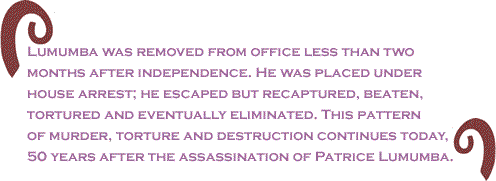
The celebrations of the life and work of Patrice Lumumba
draw heavily from his last statements on the need for Africa
to make a break and move in a new direction. We can draw
inspiration from the optimism of Lumumba, stating:
‘I write you these words without
knowing if they will reach you, when they will reach you,
or if I will still be living when you read them. All during
the length of my fight for the independence of my country,
I have never doubted for a single instant the final triumph
of the sacred cause to which my companions and myself have
consecrated our lives. But what we wish for our country
is right to an honorable life, to a spotless dignity, to
an independence without restrictions…
‘They have corrupted certain of our
fellow countrymen, they have contributed to distorting the
truth and our enemies, that they will rise up like a single
person to say no to a degrading and shameful colonialism
and to reassume their dignity under a pure sun.
‘We are not alone. Africa, Asia,
and free and liberated people from every corner of the world
will always be found at the side of the Congolese. They
will not abandon the light until the day comes when there
are no more colonizers and their mercenaries in our country.
To my children whom I leave and whom perhaps I will see
no more, I wish that they be told that the future of the
Congo is beautiful and that it expects for each Congolese,
to accomplish the sacred task of reconstruction of our independence
and our sovereignty; for without dignity there is no liberty,
without justice there is no dignity, and without independence
there are no free men.’
Even in captivity, Lumumba never wavered in his belief that
Africa will be free from the imperial overlords and their
puppets. He called on Africans to stand firm and to work
for Africa’s emancipation. Lumumba ended the letter to his
wife with these words:
‘[D]o not weep for me, my dear companion.
I know that my country, which suffers so much, will know
how to defend its independence and its liberty. Long live
the Congo! Long live Africa!’
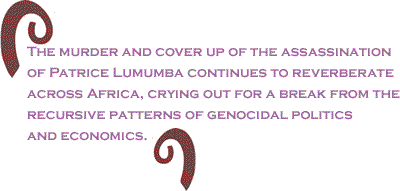
Patrice
Lumuba’s words give courage to the current freedom fighters
of Africa who should not mourn him but organise for the
freedom and unity of the continent. We must also struggle
to free Africa from African leaders who have Africanised
the iterations of imperialist tools of oppression and assassination.
Indeed, there must be an intensification of the struggle
to make a break with the iteration of the assassination
of African peoples’ dreams and aspirations. We must work
harder for the kind of Africa Lumumba foresaw when he asserted
that Africa will write its own history of dignity and glory.
We must not rest until this dream is realised. This is the
burden that history has placed on us.
BlackCommentator.com Editorial Board Member, Dr. Horace Campbell,
PhD, is Professor of African American Studies and Political
Science at Syracuse University in Syracuse New York. He is the author of Barack Obama and Twenty-first Century Politics: A Revolutionary
Moment in the USA. Click here to contact Dr. Campbell.
|

